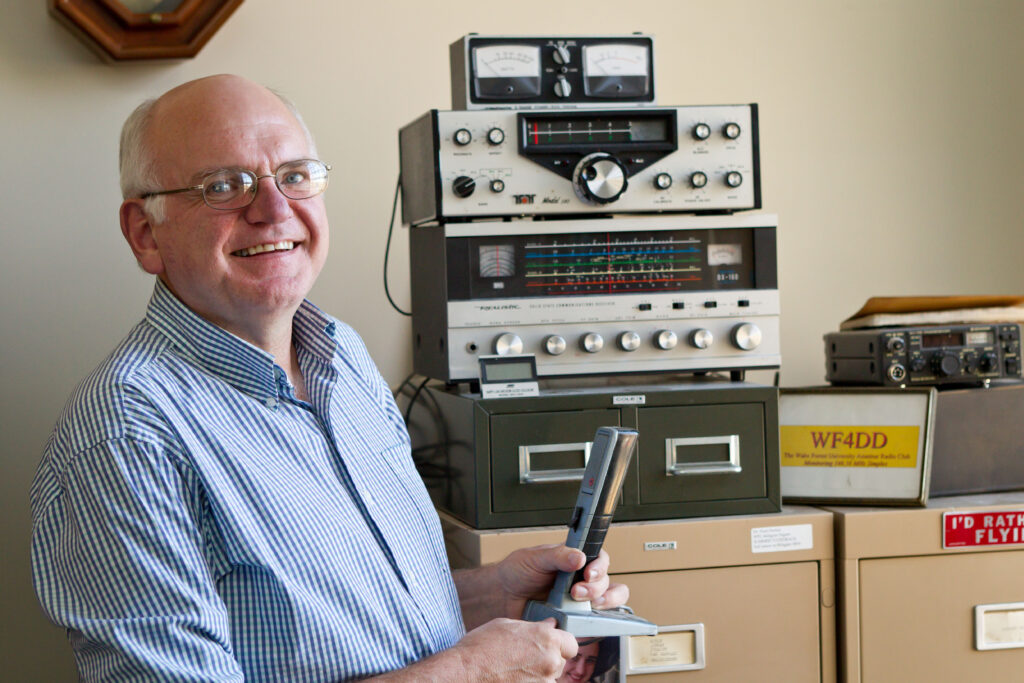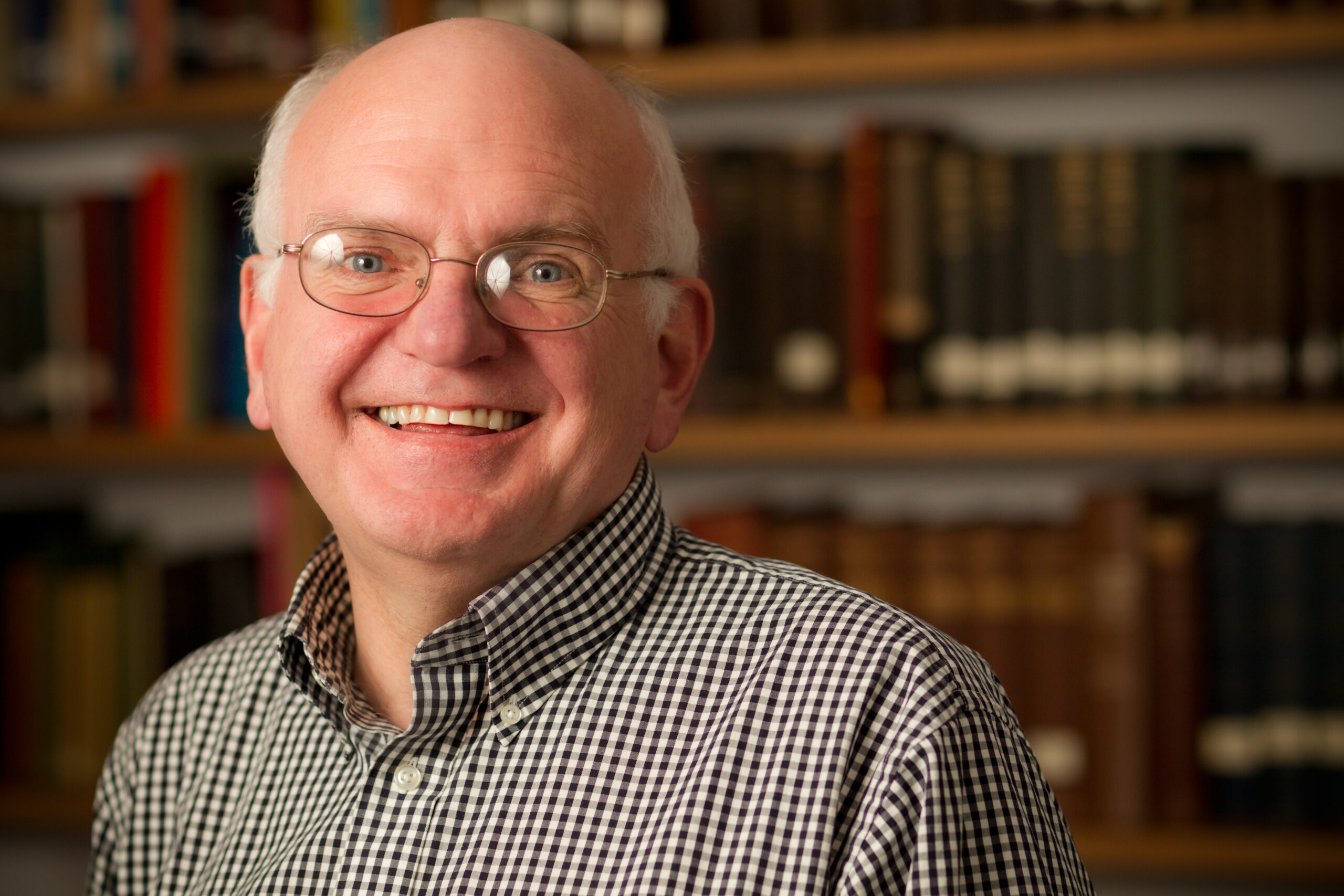Teacher-Scholar Legacies: Ken Hoglund

By Wake Forest Kahle Professor of Religious Studies and Albritton Fellow Mary Foskett

As he retires from a distinguished 34-year career teaching Hebrew Bible in the Department for the Study of Religions, Professor Kenneth (Ken) Hoglund leaves a legacy of grateful department colleagues and a long line of undergraduate and graduate students whose lives were significantly impacted by his teaching and advising. Known not only for his exemplary teaching and impactful scholarship, Ken was a wise and caring colleague to generations of faculty and an inspiring and compassionate mentor to students.
During much of his career at Wake Forest, Ken helped forge the department’s ethos and reshape its curriculum as its faculty increased in number, and the scope of their areas of specialization in religious studies grew. He directed the M.A. in Religious Studies program for 12 years, overseeing its expansion and recruiting students whose research interests included new fields that had not previously been supported. A significant number of those students went on to complete their Ph.D. in religious studies.
His humble and unassuming manner notwithstanding, Ken Hoglund’s animated lecture style made him a force of nature in the classroom, which was known as a welcoming space for students. His reputation as a caring instructor and compassionate adviser only grew as his career at Wake Forest unfolded. In addition, he frequently taught overload sections of Hebrew for students interested in learning the language and offered summer courses in the Middle East, including a 7-week program in Israel in 2000 that was a highlight of his teaching career. Brian Harrington (2000) recalls not only that Ken’s teaching opened a door for him, but he also “walked alongside me through that door, as academic advisor and instructor, especially during a four-week study trip to Israel and Palestine, accompanying me on my journey toward a more expansive and loving understanding of myself and the world.”
Religion major AJ Warr, the 2010 recipient of the Edgar Christman Award for Service, felt his academic and life trajectory change when he took his first class with Ken Hoglund. Noting to the Winston-Salem Journal in May 2010 how he was “blown away” by the experience, AJ changed his major to Religion and never looked back.
Fourteen years later, graduating senior, Anabel Ford, says, “I’ve worked with Dr. Hoglund since my freshman year, and it has been so rewarding and gratifying to study under someone with so much enthusiasm and excitement for his field. I am so thankful for the lessons taught by Dr. Hoglund – not just about Qohelet or Ruth, but about the best restaurants in the Piedmont area, how to make the most of your days off with hidden gem day trips, and how to fully enjoy and appreciate every present moment as best as you can.”
Department colleagues, grateful for the many ways in which Ken’s leadership, work, and collegiality transformed their own experience of Wake Forest, recall his characteristic generosity and care. Ken was the chair of the search committee when I was hired, and I cannot imagine a better start to a teaching career than having Ken Hoglund as a faculty mentor in our shared field of biblical studies. I remember regularly peppering him with questions about teaching, research, and publishing, always finding him willing to lend both an ear and excellent counsel. He offered support to other faculty, too, and now as Department Chair, I am aware of the many times Ken stepped in to teach for faculty experiencing circumstances that required their absence from class.
Assistant Professor Kimberly Wortmann likewise recalls Ken’s invaluable support, noting that in her early years at Wake Forest, she often “taught the ‘Joseph Story’ to illustrate the shared heritages of Jewish, Christian, and Islamic traditions in my REL110 classes. Ken graciously took the time out of his day to provide additional context on the story in Genesis, enriching my students’ understanding of the socio-cultural and theological significance within these different but related religious traditions. I have also been inspired by Ken’s passion for teaching, his willingness to collaborate, and his generosity in sharing his intellectual insights.”
Associate Professor Luke Johnston, too, experienced such generosity: “The idea for the interdisciplinary writing workshops I organized were Ken’s ideas. We were talking about Terry Tempest Williams’ writing. He floated the idea that it would be amazing to have her on campus, helping students to learn how to write evocatively about the environment. I reached out across campus to gather funds, and indeed, Terry Tempest Williams was our first facilitator for the writing workshop. There were three subsequent wiring workshops, so his idea was formative” for many students at Wake Forest.
Adding to the portrait of Ken’s selfless collegiality, Wake Forest University Distinguished Professor of Religious Studies, Simeon Ilesanmi, recounts how “Ken contributed substantially to my success as a teacher-scholar, offering on many occasions to read my manuscripts and works in progress, guided me through the tenure process, and made himself readily available for consultation and advice when I succeeded him as the Director of the Graduate Program.”
An exemplary colleague, Ken helped make the department truly a community. Many of us have treasured our impromptu conversations and friendships with Ken through the years. Professor of Religious Studies Jarrod Whitaker will miss their regular interactions: “I’ve been able to talk with him almost daily about academic issues, food, music, and our families. In particular, his vast knowledge of the Bible, Ancient Near Eastern culture, and archeology has been a real boon. I will sorely miss him, and we are poorer for the loss of his institutional knowledge, statesmanship, and critical understanding of religious studies.” Simeon Ilesanmi emphasizes how Ken is “not just a colleague, but also a friend who honored me and my family with his presence and participation in the naming ceremony of our son, Ayokunle, 25 years ago, and for that we will be forever grateful.”
Ken has also been an active and highly respected scholar. As an archaeologist, he served as co-director for the Sepphoris Regional Project and field director for the excavations at Sepphoris from 1993-1997. The results of the excavations at Sepphoris provide invaluable data about Jewish life in a Greco-Roman context in the Galilee. During excavation seasons, he worked with and mentored students from various schools, including students from Wake Forest. As a consummate teacher-scholar, he helped undergraduate and graduate students alike experience the exciting connections between his research and what he taught in the classroom. As Megan Bishop Moore (MA, 1997) recounts, “I met Ken on the dig in 1993 when I was an Electrical Engineering undergraduate at Duke just having a fun summer. He recruited me to the MA program, where he had gathered a really great group of people, and set my life on a different course. The trust he put in me as a Hebrew TA in my 2nd year was instrumental in getting a Ph.D. fellowship.”
Among his many published books, articles, chapters, and scholarly presentations, Ken’s monograph, Achaemenid Imperial Administration in Syria-Palestine and the Missions of Ezra and Nehemiah, published in 1991 and re-issued in 2007, deserves special mention. A seminal work, the book has influenced generations of scholars and shaped the study of the Persian Period in the fields of biblical and Ancient Near Eastern studies.
Ken has also given important service to his profession. Among the multiple positions he has held, highlights include serving for 6 years as the Executive Director of the Southeast Commission for the Study of Religion, and serving terms as Vice President and President of the Southeast Regional Society of Biblical Literature – American Society of Oriental Research Group.
Easley Professor of Religious Studies Lynn Neal summarizes Ken’s impact well, “For decades, Ken has been an invaluable asset to Wake Forest. His dedication to mentoring students, preserving the Hebrew curriculum through overload teaching, doing numerous behind-the-scenes tasks without complaint, and actively serving on committees has been exemplary. As a leader in SECSOR for many years and numerous other scholarly and local groups, he has made significant contributions to the broader community. Through hard work, passion for education, and an unwavering commitment to excellence, Ken has positively impacted countless lives. As he retires, we celebrate his impressive career and the lasting legacy he leaves behind.”
We will continue to honor that legacy and we will always be grateful for our colleague, Ken Hoglund. We wish him very well in the days ahead.

